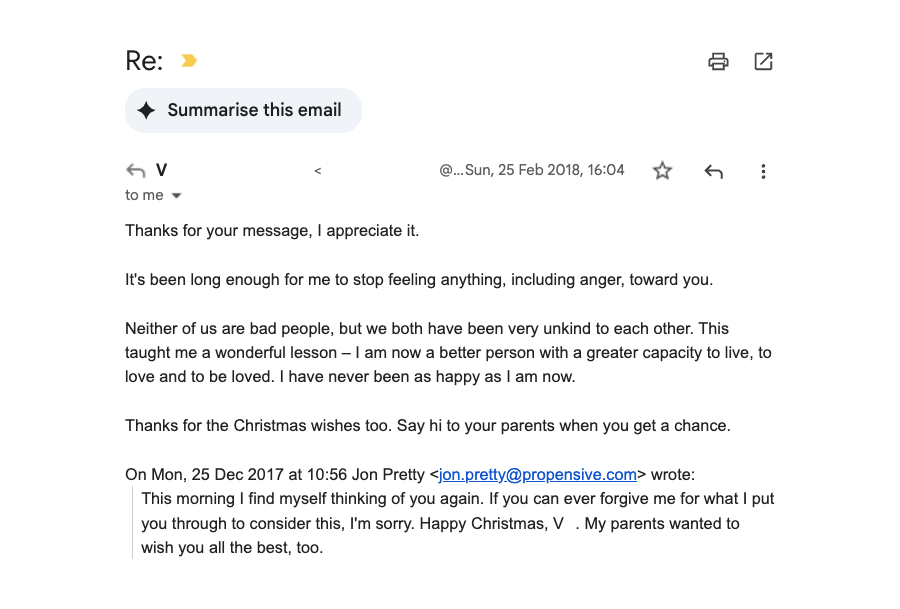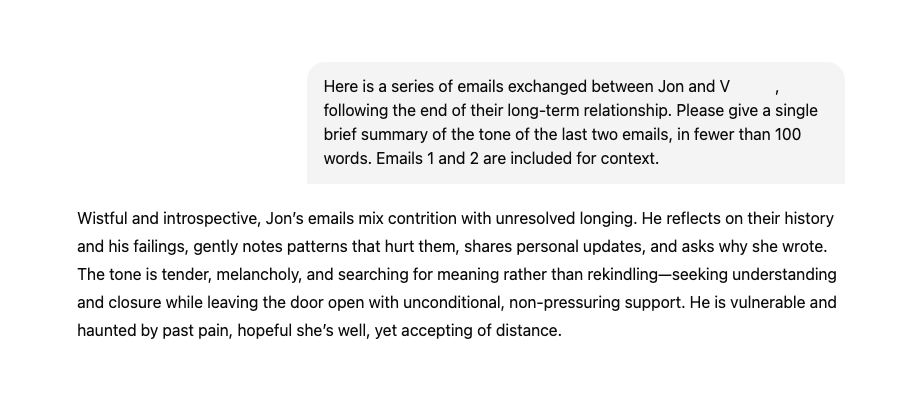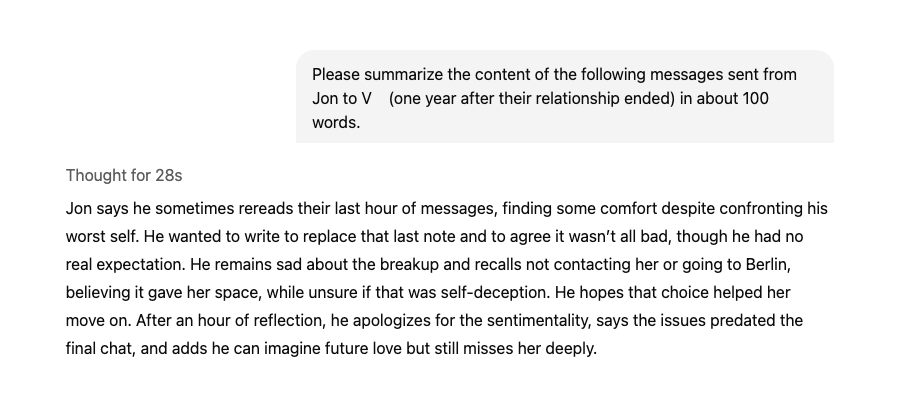The individual referenced in this post was contacted through an intermediary 24 hours before its publication, and offered the pre-publication right to review and reply, to allow her to correct mistakes or provide feedback on its content. She did not reply.
Allegation: I “harassed” V after our relationship ended
I communicated little with V after the abrupt end to our twenty-month relationship on 6 September 2017. I gave her space to get on with her life. Over 18 months after our relationship ended, I sent her a total of three emails, direct messages on three different dates, and either one or two likes on her public posts on Twitter. I do not agree with her characterization of these messages. She told me not to contact her for the second time on 27 February 2019, and I have not made contact with her since then.
Pretty continued to contact me for two more years, ignoring the clear boundaries I established. He messaged me on social media, wrote emails, and interacted with my online content despite me repeatedly telling him to never contact me again, and in many cases blocking him. All of his messages were extremely emotionally triggering, and made me feel concerned for my safety. V, I stand with Y
In my opinion, this characterization of my messages is misleading, and is antithetical to my intentions. I will share details of my communications with V.
The End
My relationship with V, which I described previously, ended on 6 September 2017. This happened a few days before Scala World 2017, which I was organizing, and which V had offered to help with.
The conference itself was stressful and challenging for unrelated reasons, but many people could see that I was emotional during my closing speech on 19 September 2017. Part of my passion during these remarks was because my twenty-month relationship with V had ended less than two weeks before.
The havoc of running a conference gave me a useful distraction. It was not until most attendees had left that I felt the sudden shock and full release of my emotions, a day after that speech. I had suppressed them until that point, out of necessity for the conference to run smoothly.
It is difficult to know which of us initiated the end of the relationship. It ended because, I think, we both recognized that it had run its course. For several months I had felt like there was increasingly a pattern in our relationship: too often, I would say something that would upset V; she would become quiet and distant, sometimes for hours afterwards; and then I would become frustrated that she seemed despondent.
The direct messages which ended the relationship started from one such frustration. V opened up to me about some deeper issues in our relationship. And my blunt honesty in that conversation led V to seal the outcome by saying, ”we both deserve better”. Perhaps a similar conversation could have happened with the same outcome a month earlier or a month later, but the stress of organizing a conference may have caused it to happen then.
She told me that she had given up her life for me, while she felt I couldn’t even compromise my career for her. She told me she had wanted to have a family with me. She said it would be hard for her not to hate me, and that she wished she had never met me. And she told me not to write to her.
I felt guilty that I hadn’t supported V enough at the end of our relationship. I felt selfish that there were times when I had prioritized my work over our relationship. But the relationship had also had a negative impact on my work, and I felt stretched to try to balance both. She had shown signs for a while that she needed more support, and while I did try to support her, I never managed to give her what she needed. I had begun to suspect that I was not the person who could give her what she needed.
I also felt guilty that I had allowed the relationship to continue longer than necessary, and that I should have recognized the inevitability of its end, and ended it proactively, sooner. Yet, I also feared that doing so would have hurt V, at a time when she seemed vulnerable. It was not easy for either of us, but I am in no doubt that the breakup was better for both of us.
The messages we exchanged over the course of about an hour, which ended the relationship, are private and it is not necessary to share them verbatim.
Immediately afterwards, V blocked me on Facebook Messenger. Around 8 September 2017 I sent her another message (of which I no longer have a record) on WhatsApp, in which I tried to placate her—but not to reconcile our relationship. She blocked me there too. I did not try to contact her on Twitter, but she blocked me there too. It was another three and a half months before I tried to contact her again.
Emails
My next message was a short email, sent on the first Christmas Day after we split up (25 December 2017). I wished V well, and asked for forgiveness.
She did not reply immediately, but—to my surprise—sent me a response two months later, shown below.
The only email from V to me after our relationship ended

All I really wanted was for the time after our relationship to be more amicable. I was never comfortable with the way it ended. I saw this email as a positive step, and hoped that we might be able to “normalize” our feelings towards each other. However, for the avoidance of doubt, I never had any interest whatsoever in resuming the relationship.
I interpreted her reply as an indication that her request never to write again was not absolute.
I replied positively to V’s email the same day. She did not reply, and I sent her another reply a month later on 30 March 2018. V did not reply to this email either, and I did not send her any more emails after this. She did not send any further emails to me.
I asked ChatGPT 5 to summarize these emails.
ChatGPT summary of two emails I sent to V in February and March 2018.

I could understand if V’s response to my emails may have been emotional. But to me, her characterization of them as “extremely emotionally triggering” sounds unlikely, knowing her, knowing what I sent her, and knowing how she replied: she appreciated my message; she was happier than ever; and she sent greetings to my parents. I cannot be certain how she reacted to the later emails, but I do not understand why she would have had such an extreme reaction.
In my opinion, nothing I said in these messages should have made her “concerned for her safety”.
Some time after I received V’s email, she unblocked me on Facebook Messenger and Twitter, and I inferred that she was no longer upholding her earlier request for no contact. I interpreted this as a sign she would be content to hear from me again, if I had something worthwhile to say.
Subsequent Messages
On 6 September 2018, one year after my relationship with V ended, I was contemplative about V, and I revisited our chat and reread the last messages we exchanged.
Since she had unblocked me, I chose that moment to sent her a series of nine messages, totalling 429 words. In these messages, I expressed my sadness that the relationship had ended the way it did.
ChatGPT summary of nine messages I sent to V, one year after our relationship ended.

These messages expressed regret and sadness, and could be described as “emotional”, but I would not characterize them as “extremely emotionally triggering”.
My intent was to be kind. I still carried guilt from that relationship. I still felt the personal culpability for many of her words at the end of that relationship, and I felt responsible for the hurt she felt. I wanted to make that better.
In my opinion, nothing I said in these messages should have made her “concerned for her safety”.
V did not reply to these messages.
Twitter Interactions
After V unblocked me on Twitter, I began to see her tweets on my timeline, again.
I did not tweet to V or refer to her explicitly (”mentioning”) or implicitly (”subtweeting”) on Twitter. However, I clicked to like one of her tweets containing photos of her with her new partner on vacation in the Lake District—the area where my conference took place, and which both she and her partner had visited before (at least) for that reason.
It is possible that V interpreted my like as “sarcastic”, but it was not intended this way. I had found their decision to visit the Lake District surprising—even odd—given that both had traveled there in September 2016 to attend my conference, and presumably, neither would have known the area otherwise. But I thought it was a positive step that she felt comfortable sharing these photos. So I liked them.
Soon afterwards, V blocked me again on Twitter.
Clarity of Boundaries
At the end of our twenty-month relationship, V sent me a message which said, “Please don’t write me anymore”. This may appear to be a straightforward instruction. Yet, I waited a couple of days before sending another message. And I emailed her the following Christmas.
The last time I had seen V, I had expected I would see her again few days later. Instead, we ended a twenty-month relationship in one emotionally-charged conversation lasting little more than an hour.
When she first asked me not to write to her again, it was one message among 132,451. It was one heated moment at the end of a relationship of nearly two years. It was one sentiment that contrasted against thousands of sentiments she had expressed before it. I believed that V was serious when she said it, but I still cared deeply about V, and I knew she hadn’t thought about it.
I tried to balance two conflicting duties: respecting a request that was unambiguous, but said in the heat of the moment; and trying to find an empathic peace with the person I had loved for two years, and had not stopped caring about—for her to feel closure as much as for myself. Her email on 25 February 2018 went some way to justifying my choice.
However, in hindsight, I could have accepted that one response from V as remedial; sufficient closure for us both to move on with our lives, separately. I could have let her email of 25 February 2018 be our last contact.
Invitation
On 15 February 2019, I told V in a direct message that I would be visiting Berlin, her home city, on a date later that month, and I invited her for a coffee without being more specific. I hoped that, if she agreed, it would be an opportunity for a more cordial ending—closure without resentment—for both of us.
She replied on 27 February 2019 (after my visit) saying, “Please don’t try to contact me again”.
This was the second time she asked me not to contact her. Unlike the first time, this was a clear boundary, and it carried the certainty of having had 18 months’ reflection. She did not need to ask again. I have not initiated contact with her since then.
Harassment
V described my treatment of her after our relationship as harassment. I never imagined that she would see it this way. I never wished for her to feel it that way. And from the only email she sent me in that period, there is no suggestion that she saw it that way either—quite the opposite.
I cut ties with Pretty in 2017; he went on harassing me, just as he would later harass Y.
V draws a direct similarity to my later, alleged treatment of Y. I have already responded to the allegation that I gaslighted Y. Together, these allegations add credibility to the wider claim, made in the Open Letter, that my behavior followed a pattern.
My Request
If you signed the Open Letter in 2021 because you found V’s publication compelling, please reconsider her words in light of the evidence above.
Her post was hugely damaging to me. The complete absence of due process meant that none of her claims were ever verified with me before they were published.
If, like many others, you feel like justice may not have been rightly served, you can make a meaningful step towards helping me get my life back by removing your name. I am grateful for your consideration.
❧
« Allegation 6 * Allegation 8 »
Subscribe for updates
I will be publishing updates to my exculpatory evidence over the next few weeks. To register for updates, please submit your email address below.